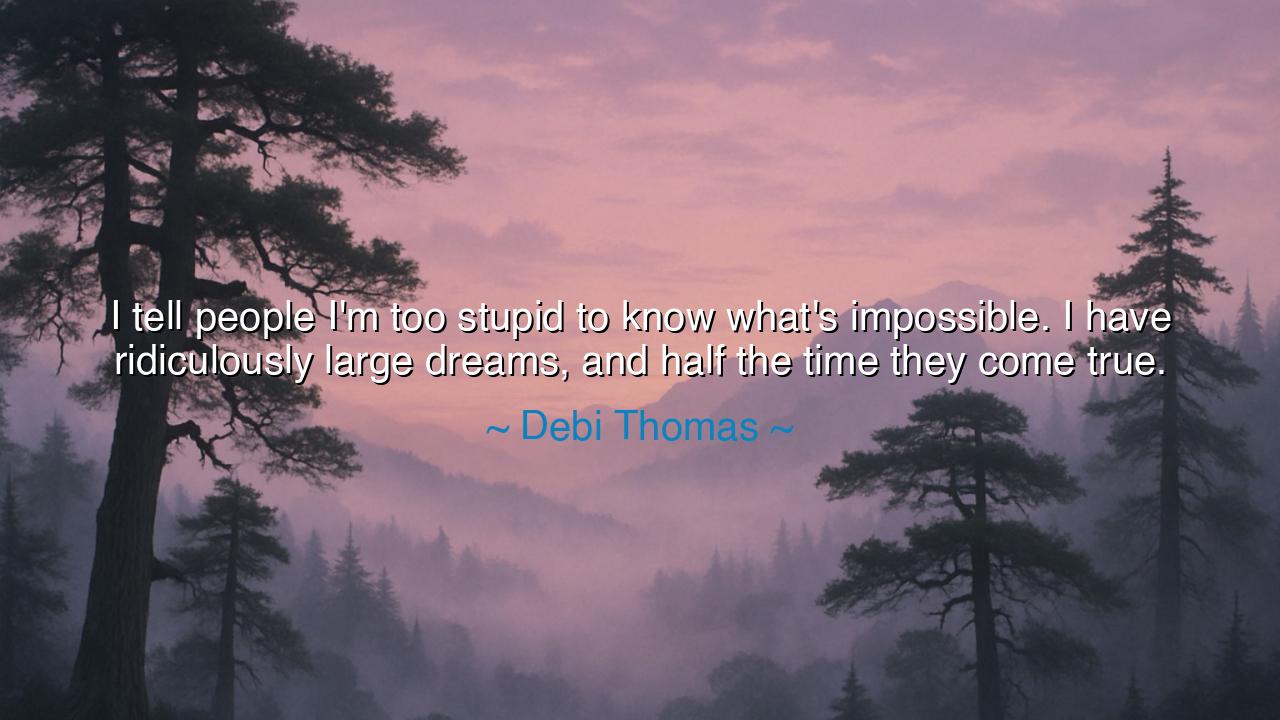
I tell people I'm too stupid to know what's impossible. I have
I tell people I'm too stupid to know what's impossible. I have ridiculously large dreams, and half the time they come true.






In the chronicles of human aspiration, where courage and vision intertwine, the words of Debi Thomas ring like a hymn to the fearless soul: “I tell people I’m too stupid to know what’s impossible. I have ridiculously large dreams, and half the time they come true.” These words, light in tone but mighty in spirit, speak of a truth older than any age — that the boundaries of possibility are drawn not by the world, but by the limits of belief. Those who dare to dream beyond reason often achieve what reason itself declares impossible.
Debi Thomas, the first African American to win a medal at the Winter Olympics, knew well the struggle of defying expectation. Her words are not arrogance, but defiance — the defiance of doubt, of fear, of the quiet voices that whisper you cannot. When she says she was “too stupid to know what’s impossible,” she speaks not of ignorance, but of innocent audacity — the divine foolishness that fuels all great achievements. For the wise often hesitate, calculating risks, while the dreamer leaps — and in that leap, the world is changed.
The ancients would have called such boldness the fire of Prometheus, who dared to steal light from the gods to gift it to mankind. In every age, this same fire burns in those who challenge the impossible — inventors, poets, warriors, and pioneers. Thomas Edison, told as a boy that he was “too slow” to learn, went on to illuminate the world. He failed a thousand times before the lightbulb shone, but to him, each failure was simply another step toward success. Like Debi Thomas, he refused to acknowledge impossibility — and that refusal became his power.
There is a sacred madness in believing that something can be done when all others say it cannot. It is the madness of the Wright brothers, watching fragile wings tremble in the wind; of Galileo, whispering “and yet it moves” to the heavens; of Rosa Parks, sitting down so the world could stand taller. History bows not to the cautious, but to the relentless — those who hold “ridiculously large dreams” and guard them like sacred flames against the storm of doubt.
Yet such daring is not without cost. Those who dream greatly must also endure greatly. Debi Thomas faced struggles both on and off the ice, yet her story reminds us that the true victory lies not only in medals or recognition, but in the act of believing when belief itself seems foolish. The world remembers her not just as an athlete, but as a symbol of tenacity — one who refused to shrink her dreams to fit the expectations of others.
The lesson, then, is this: greatness belongs to the unafraid. Be “too stupid” to accept the limits handed to you. Let others speak of practicality and probability — you, instead, must speak of vision and possibility. For those who live carefully may avoid failure, but they will also avoid triumph. The divine secret of success is simple: act before you are ready, believe before you are certain, and keep moving even when the path disappears.
So, my children of tomorrow, dream ridiculously large dreams. Let them be wild, untamed, and radiant. Do not wait for permission to believe in them. When the world calls you naive, smile — for naivety is often the first spark of genius. And when failure comes, greet it not as an enemy, but as a teacher. Half your dreams may never come true — but the half that does will be enough to change everything.
For in the end, the wise man builds within the lines, but the dreamer redraws them. And it is by such dreamers, too foolish to know what cannot be done, that the impossible becomes the inevitable.






AAdministratorAdministrator
Welcome, honored guests. Please leave a comment, we will respond soon